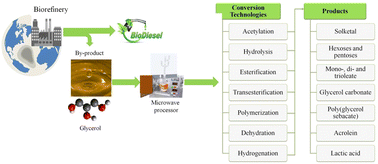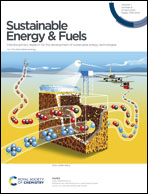Glycerol and microwave-assisted catalysis: recent progress in batch and flow devices
Abstract
Glycerol is a platform molecule allowing the production of high value-added molecules with numerous industrial applications in many different fields. Among the several studies found in the literature, the increasingly reported use of microwave (MW) radiation has been due to its valuable advantages, mainly in the reduction of reaction time, energy efficiency, and environmental aspects. Microwave heating is rapidly emerging as an effective and efficient tool in various technological and scientific fields. MW heating offers numerous advantages over conventional heating. Thus, this review article collects research results published in the last 10 years of MW-assisted synthesis of various products from glycerol. The articles were classified according to (i) the main reactions from glycerol: dehydration, esterification, etherification, carbonation, ketalization, aromatization, hydrogenation, and polymerization and (ii) the use of glycerol as an additive using MW radiation, along with examples based on the optimization of the synthesis conditions.


 Please wait while we load your content...
Please wait while we load your content...